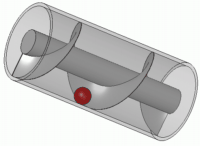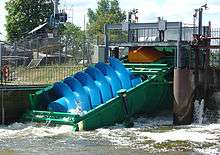Screw turbine

The screw turbine is a water turbine which uses the principle of the Archimedean screw to convert the potential energy of water on an upstream level into kinetic energy. It may be compared to the water wheel, though the screw turbine has a much higher efficiency. The turbine consists of a rotor in the shape of an Archimedean screw which rotates in a semicircular trough. Water flows into the turbine and its weight presses down onto the blades of the turbine, which in turn forces the turbine to turn. Water flows freely off the end of the turbine into the river. The upper end of the screw is connected to a generator through a gearbox.
History

The Archimedean screw is an ancient invention, attributed to Archimedes of Syracuse (287–212 BC.), and commonly used to raise water from a watercourse for irrigation purposes. In 1819 the French engineer Claude Louis Marie Henri Navier (1785–1836) suggested using the Archimedean screw as a type of water wheel. In 1922 William Moerscher patented the hydrodynamic screw turbine in America.
Application
The Archimedean screw turbine is applied on rivers with a relatively low head (from 1 m to 10 m) and on low flows (0.01 m³/s up to around 10 m³/s on one turbine). Due to the construction and slow movement of the blades of the turbine, the turbine is considered to be friendly to aquatic wildlife. It is often labelled as "fishfriendly". The Archimedean turbine may be used in situations where there is a stipulation for the preservation and care of the environment and wildlife.
Notable examples in the UK include
- Devon, Totnes 320 kW , Commissioned December 2015[1]
- Romney, Berkshire, 270 kW, Installed to provide a renewable source of energy to Windsor Castle, Commissioned July 2013[2]
- Bealey’s Weir, Radcliffe, 100 kW, Commissioned May 2012[3]
- Mapledurham, River Thames, UK’s largest flow capacity (8 cumec) single screw, 99 kW.[4]
- Buckfast, River Dart, screw turbine and fishpass, 84 kW[4]
- UK’s first community owned hydro scheme, and fishpass, 63 kW at New Mills.[4]
- UK’s first grid connected screw turbine, 50 kW at River Dart Country Park.[4]
- Bainbridge, community owned screw turbine, 37 kW[4]
- Tipton, River Otter, 30 kW[4]
- Rochdale, screw turbine and fishpass, 20 kW[4]
- Cragside, the birthplace of hydroelectricity, 12 kW[5]
Literature
- P. J. Kantert: Manual for Archimedean Screw Pump, Hirthammer Verlag 2008, ISBN 978-3-88721-896-6
- P. J. Kantert: Praxishandbuch Schneckenpumpe. Hirthammer Verlag 2008, ISBN 978-3-88721-202-5
- William Moerscher - Patent US1434138
- K. Brada, K.-A. Radlik - Water Screw Motor to Micro Power Plant - First Experiences of Construction and Operation (1998)
- K. Brada - Micro Power Plant with Water Screw Motor (1995)
- K. Brada, K.-A. Radlik - Water Power Screw - Characteristic and Use (1996)
- K. Brada, K.-A. Radlik, (1996). Water screw motor for micropower plant. 6th Intl. Symp. Heat exchange and renewable energy sources, 43–52, W. Nowak, ed. Wydaw Politechniki Szczecińskiej, Szczecin, Poland.
See also
References
- ↑ "Totnes | MannPower Consulting". www.mannpower-hydro.co.uk. Retrieved 2016-08-05.
- ↑ "Romney | MannPower Consulting". www.mannpower-hydro.co.uk. Retrieved 2016-08-05.
- ↑ "Bealeys Weir | MannPower Consulting". www.mannpower-hydro.co.uk. Retrieved 2016-08-05.
- 1 2 3 4 5 6 7 "Hydro Power Case Studies, Micro-Hydro Case Studies - Western Renewable Energy". www.westernrenew.co.uk. Retrieved 2016-08-05.
- ↑ "Hydropower returns to Cragside". National Trust. Retrieved 2016-08-09.
External links
| Wikimedia Commons has media related to Archimedes' screw power plants. |
- Archimedes' screw
- Commercially available hydrodynamic screw turbine
- Information on one of the manufacturers
- (Polish) The first screw turbine in Poland